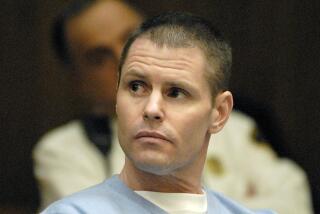Official Defends Shielding Fugitive Sibling
- Share via
BOSTON — University of Massachusetts President William M. Bulger on Tuesday defended his decision not to alert law enforcement authorities after being contacted by his fugitive mobster brother in 1995.
Bulger said his brother, James “Whitey” Bulger, called him in January 1995 -- shortly after he fled Massachusetts -- and asked for legal advice.
“It was a private conversation,” William Bulger said, when asked by reporters why he didn’t report the contact with his brother to authorities.
Bulger said the brief conversation was the only contact he has had with his brother since he left the state just before he was indicted on racketeering counts.
“I have no knowledge of his whereabouts,” Bulger, 68, said Tuesday. James Bulger, 73, has been indicted on charges related to 18 murders, and he is on the FBI’s 10 Most Wanted list.
William Bulger’s remarks Tuesday came in response to a published report about his testimony before a federal grand jury last year. The Boston Globe, which obtained a copy of transcripts of Bulger’s testimony, reported Tuesday that Bulger told the grand jury that his brother called him seeking legal advice. He said he didn’t urge him to surrender to authorities because he didn’t “think it would be in his interest to do so.”
Bulger also acknowledged that he did not feel compelled to help authorities find his brother.
“It’s my hope that I’m never helpful to anyone against him.... I don’t feel an obligation to help everyone to catch him,” he said.
Bulger told reporters Tuesday that his lawyers were still evaluating whether he would appear before a congressional committee holding hearings in Boston on Thursday and Friday.
Attorney Thomas Kiley has not said whether he will fight the subpoena for his client to testify Friday.
The panel, led by Rep. Dan Burton (R-Ind.), set the hearings as part of its probe of the Justice Department’s handling of mob informants. It has focused on the ties between Boston FBI agents and the hit men and mob leaders they cultivated -- and sometimes protected from prosecution for crimes as serious as murder.
More to Read
Sign up for Essential California
The most important California stories and recommendations in your inbox every morning.
You may occasionally receive promotional content from the Los Angeles Times.













